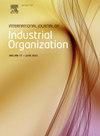Optimal auctions with sequential arrival: Allowing for re-auction and resale
IF 1.4
3区 经济学
Q2 ECONOMICS
International Journal of Industrial Organization
Pub Date : 2025-03-18
DOI:10.1016/j.ijindorg.2025.103158
引用次数: 0
Abstract
The sequential arrival of bidders is a crucial aspect of real-world auctions, providing the auctioneer with incentives for re-auctioning and bidders with opportunities for resale. This paper investigates the optimality of sequential auctions, focusing on scenarios where the auctioneer can re-auction items and tap into potential future resale demand. Specifically, when bidders arrive in two batches, the auctioneer first conducts an English auction for the initial batch. If unsuccessful, the item is re-auctioned to both batches of bidders; otherwise, the winner can opt to resell to current and future bidders. I characterize the optimal sequential English auctions, noting that the auctioneer's belief about the value distribution of the first batch is necessarily limited after the initial auction fails. The findings demonstrate that, on the optimal reserve price path, the first batch always retains a positive winning probability in the re-auction. Furthermore, I identify conditions under which resale does not occur in equilibrium due to a high optimal reserve price in the initial auction. Thus, when the auctioneer can set optimal reserve prices and access resale demand, resale can be implicitly prohibited. These results provide important policy implications for auctions in both the private and public sectors.
有顺序到达的最优拍卖:允许再拍卖和转售
竞标者的连续到达是现实世界拍卖的一个重要方面,它为拍卖商提供了重新拍卖的动机,也为竞标者提供了转售的机会。本文研究了顺序拍卖的最优性,重点关注拍卖人可以重新拍卖物品并挖掘潜在的未来转售需求的场景。具体来说,当竞标者分两批到达时,拍卖师首先对第一批进行英文拍卖。如果不成功,该物品将被重新拍卖给两批竞标者;否则,中标者可以选择转售给当前和未来的竞标者。我描述了最优的顺序英国拍卖,注意到拍卖师对第一批价值分布的信念在首次拍卖失败后必然受到限制。结果表明,在最优保留价格路径下,第一批产品在再次拍卖中始终保持正的获胜概率。此外,我还确定了由于初始拍卖中较高的最优保留价格而导致转售不会均衡发生的条件。因此,当拍卖商可以设定最佳保留价格并获得转售需求时,转售可以被隐性禁止。这些结果为私营和公共部门的拍卖提供了重要的政策启示。
本文章由计算机程序翻译,如有差异,请以英文原文为准。
求助全文
约1分钟内获得全文
求助全文
来源期刊
CiteScore
2.50
自引率
6.70%
发文量
48
审稿时长
77 days
期刊介绍:
The IJIO is an international venture that aims at full coverage of theoretical and empirical questions in industrial organization. This includes classic questions of strategic behavior and market structure. The journal also seeks to publish articles dealing with technological change, internal organization of firms, regulation, antitrust and productivity analysis. We recognize the need to allow for diversity of perspectives and research styles in industrial organization and we encourage submissions in theoretical work, empirical work, and case studies. The journal will also occasionally publish symposia on topical issues.

 求助内容:
求助内容: 应助结果提醒方式:
应助结果提醒方式:


